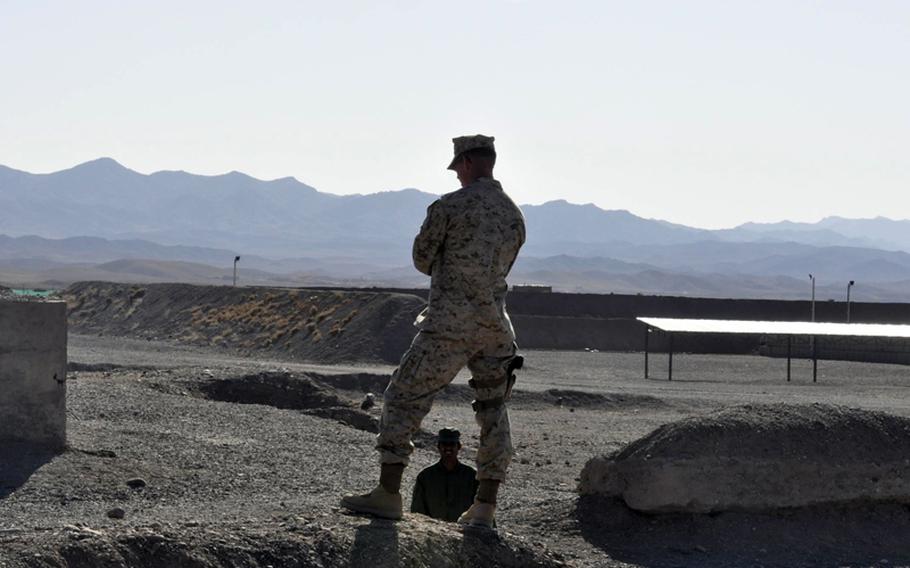
Marine Lance Cpl. Gordon Sherburne is a cook back home at Camp Lejeune, N.C. But on this deployment to Afghanistan, he is part of a Marine team training Afghan police recruits. The Marines deployed training teams to counter the chronic shortage of NATO trainers for the Afghan police and army. (Geoff Ziezulewicz/Stars and Stripes)
ADRASKAN NATIONAL TRAINING CENTER, Afghanistan — What do you get when you throw together a Marine Corps cook, a radio operator, an ordnance specialist, two grunts and an assortment of Marines in other occupations?
The Corps’ motley contribution to the fledgling Afghan police and army training effort.
Seventeen Marine teams have deployed this year across the country to fill the void in trainers that is facing NATO-Training Mission-Afghanistan, which has revamped Afghan police training efforts in the past year.
NATO is racing to build the Afghan army and police ranks to 305,000 by October. Self-sufficient, professional Afghan forces are cited by NATO leaders as a key step in ending the nine-year war.
The Afghan training mission has faced a chronic shortfall of trainers from NATO countries. NTM-A commander Lt. Gen. William Caldwell has stressed that with no trainers, there can be no transition. Still, many NATO states have been slow to pony up personnel for these slots.
The Marine Corps has helped fill the training shortfall since March, after Caldwell asked Gen. James Conway, then-Marine Corps commandant, for help bridging the gap, according to 1st Lt. Brandon Kocher, the detachment’s officer in charge.
The Marines at Adraskan National Training Center — mostly young, junior-enlisted men, many on their first deployment — say they volunteered for the mission. Each day, they teach hundreds of Afghan National Civil Order Police recruits everything from shooting to room clearance. The ANCOP is a paramilitary arm of the police force.
Since every Marine is a rifleman, they are well-suited to the training mission, regardless of their job specialty, Kocher said.
The Italian Carabinieri, a paramilitary-style police unit, comprises the bulk of the NATO training force at Adraskan. Nestled in the desert mountains of western Afghanistan’s Herat province, the center is touted as the most sophisticated in the country.
While the Carabinieri help the Afghan recruits hone more traditional policing skills, the Marines bring a unique military perspective to the combat side of training, according to Italian Lt. Col. Tulio Mott, head of training at Adraskan.
In the past year, Afghan civil order police have deployed to volatile areas like Helmand and Kandahar provinces, putting an Afghan face to NATO efforts there. They are particularly vital when there are incompetent or absent Afghan uniform police in the hot spots.
So while policing skills and riot control classes are essential, the men must also know how to fight, Tulio said, and the Marines bring that to the table.
“The most important requirement for the ANCOP is to survive,” he said.
This current cycle of Marine trainers — the third rotation here since the program began — will be replaced by Marine Corps reservists, Kocher said. NTM-A officials say the Marine training effort will continue for the foreseeable future.
Their deployments typically last 90 days, and the Adraskan Marines are slated to leave this month, although some may extend.
The man in charge, Sgt. Daniel Ford, 31, of College Park, Md., said the team assembled at Camp Lejeune, N.C., before deploying and trained in everything from Afghan culture to how to set up a firing range.
“This isn’t a normal deployment,” Ford said. “This is something completely different that hardly comes around.”
Most of the Marines here work jobs that keep their deployments inside the wire on big bases, leaving little chance to interact with the locals.
At Adraskan, they interact every day with the people and culture.
“A lot of people go to Iraq and Afghanistan and never meet an Iraqi or Afghan,” said Cpl. Adam Powell, 25, of Greenville, S.C.
Lance Cpl. Chad Berry, a small-arms technician, deployed to Iraq twice and saw fighting there. He’s getting out of the Marines soon but volunteered for this deployment.
The 21-year-old from Dunlap, Tenn., said he expected to do more training and patrols outside the wire.
When asked what advice he would give to his replacement, Berry said he would emphasize keeping calm and realizing the challenges posed by the language barrier.
“Be very, very patient,” he said. “Don’t scream and yell. You scream and yell, and they won’t listen to you.”